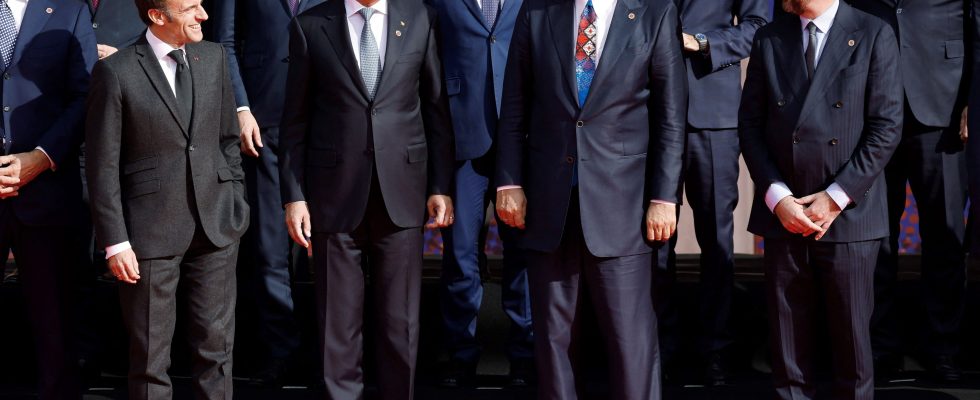A meeting in the midst of regional tensions. The leaders of the Western Balkans and several European countries are meeting this Monday, October 16, in Tirana for the 9th summit of the Berlin process. L’Express deciphers the issues for you.
What is the “Berlin Process”?
Launched in 2014 by Angela Merkel, the “Berlin process” aims to promote political dialogue, cooperation and reconciliation between six Western Balkan countries: Albania, Bosnia-Herzegovina, Kosovo, North Macedonia, Montenegro and Serbia.
It is also an arena where rapprochement with the European Union is being worked on. Nine Member States are involved (Austria, Bulgaria, Croatia, France, Germany, Greece, Italy, Slovenia and Poland) as well as the United Kingdom. Joined this year, at the invitation of Albanian Prime Minister Edi Rama, are Hungary, the Netherlands, Romania and Spain.
Last year, the summit resulted in several agreements on free movement and residence in the region, the recognition of university qualifications and the recognition of qualifications for certain professions. The President of the European Commission also took the opportunity to announce a one billion euro energy support plan.
What discussions are on the agenda?
On the menu for the one-day summit, discussions on “improving convergence with the European Union” – which the Western Balkans want to integrate, and on “supporting the ecological and digital transition” in the region. Upon her arrival in Albania on Sunday, Ursula von der Leyen, the President of the European Commission, welcomed the opening of an annex of the College of Europe in Tirana.
“Albania is on the path to joining the EU,” she said at a press conference with Prime Minister Edi Rama, “enlargement is at the top of our priorities.” “We can expect more declarations than decisions,” said Simonida Kacarska, researcher and director of the European Policy Institute, a thinktank based in North Macedonia. And added: “Last year, there was something really important on the table – the free movement agreement in particular. This year we are not expecting much, but we can always hope for a surprise” .
The arrival of President Macron is also symbolic since France has long opposed the EU enlargement process and the opening of accession negotiations with Albania and North Macedonia. Today, Paris is campaigning for an enlarged Europe, but at “several speeds”, while Charles Michel, the president of the European Council, has set the objective of enlargement in 2030.
Is the Berlin process in danger?
In the past decade, says Florian Bieber, “the Berlin process has produced many agreements, but with little follow-up. In Vienna, in 2015, the foreign ministers of the six countries committed to a declaration not to allowing bilateral tensions to interfere with the EU accession process. “They were also committed to working on these bilateral conflicts,” adds the researcher, coordinator of the Balkans in Europe Policy Advisory Group (BiEPAG). “Despite this commitment – which they have renewed several times, there has been no follow-up mechanism. And these conflicts continue to poison the region.”
German Foreign Minister Annalena Baerbock regretted Friday from Tirana, Albania, that tensions between Serbia and Kosovo “endanger the Berlin process”, which has been trying for almost 10 years to bring the Balkan countries closer together. Tensions between Belgrade and Pristina have reached levels not seen in years in recent weeks. The death of a Kosovar police officer killed by a commando composed of Kosovo Serbs, the death of three of them in clashes with the police, the participation in the violence of a relative of Belgrade and the discovery of a veritable arsenal of war by the Kosovar authorities have created an explosive cocktail.
“We have plenty to do,” recognizes an advisor to Emmanuel Macron, “with a cause for concern both on Serbia-Kosovo and then on Bosnia.” “It is very important that Kosovo and Serbia return to the path of normalization of their relationship […] and the place to do it is dialogue under the auspices of the EU”, von der Leyen said on Sunday, “this is the path to a future where Kosovo and Serbia will be members of the European Union” .
The Serbian president will not be in Tirana: Aleksandar Vucic will be on the plane to Beijing where he will participate in the New Silk Roads forum – and must sign a free trade agreement with China. It is his Prime Minister, Ana Brnabic, who will be present. For Katarina Radic, political science researcher, Vucic’s absence is “a clear sign of ill will”, which she believes risks isolating Belgrade on the regional scene.
